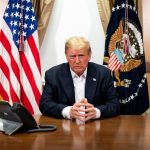In what can only be described as an odd farewell performance, Joe Biden took to the Oval Office to address the nation for what he proclaimed to be his final speech as president. Despite the brevity of his address, it was loaded with the nonsensical ramblings that have come to define his time in office, leaving listeners questioning whether he was even aware of the event’s significance. Instead of a dignified goodbye, it felt more like a haphazard rant echoing through the empty halls of a fading administration.
Seated at the Resolute Desk, surrounded by the trappings of power, Biden’s focus seemed to drift toward the minutiae of social media dynamics, bizarrely choosing to discuss the supposed decline of “fact-checking” on platforms that a surprising number of Americans have already moved past. With this peculiar fixation, it was apparent that his handlers had either thrown in the towel or were simply desperate to fill air time. Instead of uplifting messages or a stirring call to the nation, viewers were treated to a perplexing lecture about the perils of misinformation, as if the integrity of American democracy hinged on some bot’s fact-checking abilities.
Biden ends his presidency by using rhetoric that would be right at home in a third-world communist dictatorship.
This may be the worst farewell speech in presidential history.
— Bonchie (@bonchieredstate) January 16, 2025
The irony wasn’t lost on anyone; while past presidents have used farewell addresses to reflect on their legacies and aspirations for the future, Biden reverted to grievances often heard in a tinpot dictatorship. Can someone explain what it is about his presidency that has led him to believe the government should regulate information in such an authoritarian fashion? The alarming parallels between Biden’s rhetoric and the practices of oppressive regimes raise eyebrows, especially coming from a leader supposed to embody democracy. It’s a telling sign of a man out of touch with the foundational American ideals of free expression and personal responsibility.
In a move typical of his presidency, Biden once again pounced on natural disasters occurring in the country to push a climate change agenda that has grown tiresome. The events in North Carolina and California were turned into political talking points, as he grasped at the straws of climate alarmism in a bid to justify his administration’s costly energy policies. Hurricanes have wreaked havoc for centuries—this isn’t a new phenomenon. Yet, with a swagger of self-importance, Biden attempted to frame climate concerns as his administration’s great battle, ignoring the fact that many fires were ignited by reckless human actions rather than global climate trends.
Moreover, infusing a healthy dose of irony, Biden launched into a diatribe about a supposed “oligarchy” forming in America, primarily populating his narrative with those billionaires who oppose his agenda. Meanwhile, he conveniently overlooked the recent award given to George Soros, a man whose wealth is primarily funneled into promoting leftist policies. It is no secret that a number of affluent individuals rallied behind Kamala Harris during the last election, yet there was no acknowledgment of this glaring contradiction. It seems Biden’s gripes are reserved only for those whose financial backing doesn’t align with his political views, portraying a distorted vision of fairness underpinned by selective grievances.
Finally, the conversational flow of Biden’s speech crescendoed into a moment of forgettable clarity when he read “end of quote” directly from the teleprompter, capturing the essence of his entire administration: disjointed, unfocused, and ultimately inadequate. As he stumbles toward the exit, it is unlikely history will repeat its fondness for forgotten presidencies like Jimmy Carter’s when assessing Biden’s impact—a collective memory of his tenure will likely conclude he fell short of the mark even by those low standards. Without any compelling legacy and riddled with critique, Joe Biden’s presidency can only be characterized as one of the lowest points in modern American history.




